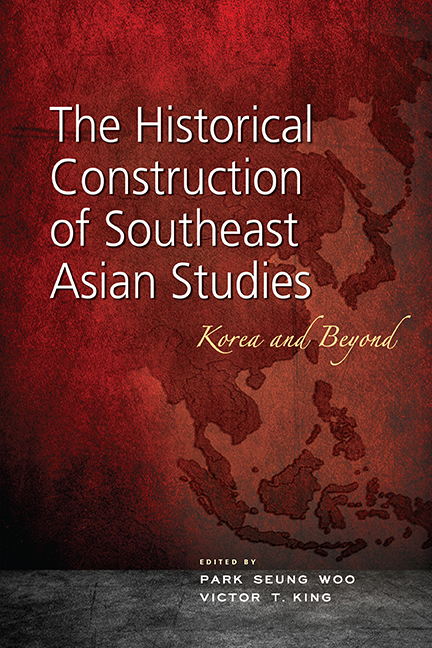Book contents
- Frontmatter
- Contents
- List of Tables
- List of Figures
- Foreword
- Acknowledgements
- About the Contributors
- 1 Introduction: The Historical Construction of Southeast Asian Studies and the Emergence of a Region
- PART I NORTHEAST ASIA
- 2 Southeast Asian Studies in China: Progress and Problems
- 3 Studies of Southeast Asian History in Contemporary Japan: The 1990s and 2000s
- 4 The Historical Construction of Southeast Asian Studies in Korea
- PART II SOUTHEAST ASIA
- PART III EUROPE
- PART IV AUSTRALIA AND THE U.S.
- Index
4 - The Historical Construction of Southeast Asian Studies in Korea
from PART I - NORTHEAST ASIA
Published online by Cambridge University Press: 21 October 2015
- Frontmatter
- Contents
- List of Tables
- List of Figures
- Foreword
- Acknowledgements
- About the Contributors
- 1 Introduction: The Historical Construction of Southeast Asian Studies and the Emergence of a Region
- PART I NORTHEAST ASIA
- 2 Southeast Asian Studies in China: Progress and Problems
- 3 Studies of Southeast Asian History in Contemporary Japan: The 1990s and 2000s
- 4 The Historical Construction of Southeast Asian Studies in Korea
- PART II SOUTHEAST ASIA
- PART III EUROPE
- PART IV AUSTRALIA AND THE U.S.
- Index
Summary
Introduction
The origin of “Southeast Asian Studies” in the Republic of Korea can be traced back to the early 1960s. But it was not until the late 1980s that any serious academic research on Southeast Asia began in earnest. Since then many Korean scholars who can be regarded as Southeast Asia area specialists, or “Southeast Asianists” have joined this academic discipline or field of study. The exact number of Korean Southeast Asianists is not known, however, it can be estimated roughly at 150 to 200; the number varies in accordance with what criteria we use in determining the membership of the academy of Southeast Asianists. If we apply a relatively strict standard, as I do in this study, the number may not exceed 150.Among them, the number of Southeast Asianists who are in the disciplines of social sciences and history will be around 120 or so; others are in the fields of Southeast Asian languages and literature (Park S.W. 2009).
The small size of the membership should not be denigrated, however, if we take into consideration the relatively short history — a little over twenty years — of Southeast Asian Studies in Korea and its humble origins. For those approximately 120 social scientists and historians working in this field, there are several possible ways of categorizing them. One way is to divide them into two categories or generations and draw a demarcation line around the mid-1990s. In this way, the first generation of local academics on Southeast Asia comprises those who began their careers as Southeast Asian area specialists prior to the mid-1990s, while the second category/ generation started their academic research careers after that period.
This chapter examines how the research undertaken by Korean area specialists on Southeast Asia has evolved over time in accordance with changes that have taken place from inside and outside the academia during the last three decades. In particular it seeks to map various research agendas and themes as well as methodologies that have been pursued by Korean academics in different periods — in the 1980s, the 1990s and the 2000s. It also attempts to identify the institutional developments that have been taking place with regard to Southeast Asian Studies.
- Type
- Chapter
- Information
- The Historical Construction of Southeast Asian StudiesKorea and Beyond, pp. 112 - 156Publisher: ISEAS–Yusof Ishak InstitutePrint publication year: 2013



